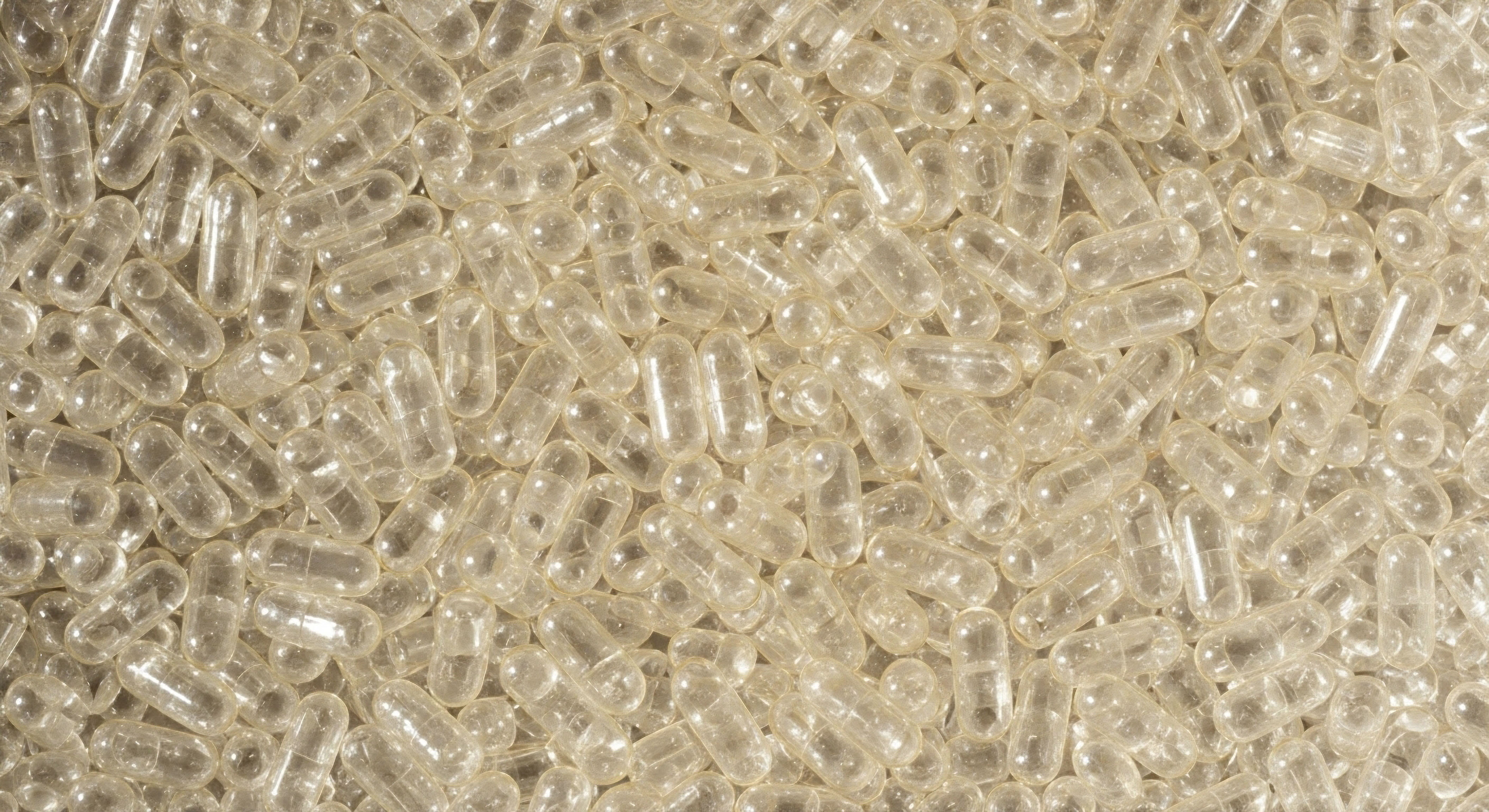

Fundamentals
Many individuals experience a subtle, yet persistent, decline in their overall vitality, a feeling that their internal equilibrium has shifted. This often manifests as a creeping fatigue, a diminished drive, or a sense that their physical and mental sharpness has dulled. Such changes can be disorienting, prompting a deep desire to understand the underlying biological shifts contributing to these lived experiences. Recognizing these sensations marks the beginning of a personal exploration into the intricate systems governing our well-being.
Testosterone, a steroid hormone, plays a far more expansive role than commonly perceived, extending beyond its well-known influence on male characteristics. It acts as a vital chemical messenger, orchestrating numerous physiological processes across the human body. This hormone is present in both men and women, albeit in differing concentrations, performing essential functions in metabolic regulation, bone density maintenance, and cognitive clarity. Understanding its systemic impact provides a clearer picture of its importance.
Stable testosterone levels are fundamental for maintaining comprehensive physiological balance and overall vitality.

The Body’s Hormonal Messaging System
The production and regulation of testosterone involve a sophisticated communication network known as the hypothalamic-pituitary-gonadal system. This biological circuit functions much like a precise internal thermostat, constantly monitoring and adjusting hormone output. The hypothalamus, a region in the brain, initiates the process by releasing gonadotropin-releasing hormone (GnRH). This signal then travels to the pituitary gland, a small organ situated at the base of the brain.
Upon receiving the GnRH signal, the pituitary gland releases two key hormones ∞ luteinizing hormone (LH) and follicle-stimulating hormone (FSH). In men, LH stimulates the Leydig cells in the testes to produce testosterone. FSH, conversely, supports sperm production. In women, LH and FSH regulate ovarian function, influencing the production of estrogen and progesterone, alongside smaller amounts of testosterone. This intricate feedback loop ensures that hormone levels remain within a healthy range, responding to the body’s changing needs.

Testosterone’s Widespread Influence
Testosterone receptors are distributed throughout nearly every tissue type, underscoring the hormone’s pervasive influence. Its presence is essential for maintaining muscle mass and strength, contributing to a robust physical structure. Bone mineral density relies significantly on adequate testosterone, helping to prevent conditions like osteoporosis. The hormone also impacts red blood cell production, supporting oxygen transport throughout the body.
Beyond physical attributes, testosterone contributes to cognitive function, influencing mood regulation and mental acuity. Individuals with suboptimal levels often report a decline in concentration and a general sense of unease. A balanced hormonal environment, therefore, contributes to a stable emotional state and sustained mental performance. The long-term health outcomes associated with maintaining stable testosterone levels extend across multiple physiological domains, impacting quality of life and longevity.


Intermediate
Addressing suboptimal testosterone levels requires a clinically informed approach, often involving specific therapeutic protocols designed to restore physiological balance. These interventions are not merely about increasing a number on a lab report; they aim to recalibrate the body’s internal systems, alleviating symptoms and promoting long-term health. The selection of a protocol depends on individual needs, biological markers, and overall health objectives.

Hormonal Optimization Protocols for Men
For men experiencing symptoms of low testosterone, often termed andropause, Testosterone Replacement Therapy (TRT) is a common and effective intervention. The standard protocol frequently involves weekly intramuscular injections of Testosterone Cypionate, typically at a concentration of 200mg/ml. This method delivers a consistent supply of the hormone, helping to stabilize circulating levels.
To support the body’s natural testosterone production and preserve fertility, Gonadorelin is often included. This peptide is administered via subcutaneous injections, usually twice weekly. Gonadorelin acts as a GnRH analog, stimulating the pituitary gland to release LH and FSH, thereby encouraging testicular function. Another important component is Anastrozole, an oral tablet taken twice weekly.
This medication functions as an aromatase inhibitor, preventing the conversion of testosterone into estrogen, which can mitigate potential side effects such as gynecomastia or fluid retention. In some cases, Enclomiphene may be added to further support LH and FSH levels, particularly when fertility preservation is a primary concern.
Personalized hormonal protocols aim to restore systemic balance, addressing symptoms and supporting long-term well-being.

Hormonal Balance Strategies for Women
Women, particularly those in pre-menopausal, peri-menopausal, or post-menopausal stages, can also experience symptoms related to suboptimal testosterone levels, including irregular cycles, mood fluctuations, hot flashes, and diminished libido. Targeted hormonal support can significantly improve these conditions. A common protocol involves Testosterone Cypionate, typically administered weekly via subcutaneous injection at a lower dose, such as 10 ∞ 20 units (0.1 ∞ 0.2ml).
Progesterone is often prescribed alongside testosterone, with its dosage and application tailored to the woman’s menopausal status. This hormone plays a vital role in uterine health and overall hormonal equilibrium. For some women, long-acting testosterone pellets offer a convenient alternative, providing sustained hormone release over several months. Anastrozole may be incorporated into female protocols when appropriate, particularly if there is a clinical indication for managing estrogen levels.

Supporting Natural Production Post-Therapy
Men who have discontinued TRT or are actively trying to conceive often follow a specific protocol to stimulate their body’s endogenous testosterone production. This approach aims to reactivate the natural hormonal pathways. The protocol typically includes Gonadorelin, which helps to re-engage the pituitary gland.
Tamoxifen and Clomid are also frequently utilized; these medications work by blocking estrogen receptors, thereby signaling the brain to increase LH and FSH release. Anastrozole may be optionally included to manage estrogen conversion during this recalibration phase.
The following table summarizes common components of male and female hormonal optimization protocols ∞
| Protocol Type | Key Medications | Primary Purpose |
|---|---|---|
| Male TRT | Testosterone Cypionate, Gonadorelin, Anastrozole, Enclomiphene | Restore testosterone levels, preserve fertility, manage estrogen |
| Female Hormonal Support | Testosterone Cypionate, Progesterone, Testosterone Pellets, Anastrozole | Address menopausal symptoms, improve libido, balance hormones |
| Post-TRT/Fertility (Men) | Gonadorelin, Tamoxifen, Clomid, Anastrozole (optional) | Stimulate natural testosterone production, support conception |

Peptide Therapies for Systemic Support
Beyond direct hormonal replacement, specific peptide therapies offer targeted support for various physiological functions, contributing to overall well-being and longevity. These small chains of amino acids act as signaling molecules, influencing diverse biological processes.
- Growth Hormone Peptides ∞ These agents, such as Sermorelin, Ipamorelin / CJC-1295, Tesamorelin, Hexarelin, and MK-677, stimulate the body’s natural production of growth hormone. They are often sought by active adults and athletes for their potential benefits in anti-aging, muscle gain, fat loss, and sleep quality improvement.
- PT-141 ∞ This peptide is specifically utilized for sexual health, addressing concerns related to libido and sexual function in both men and women. It acts on the central nervous system to influence sexual desire.
- Pentadeca Arginate (PDA) ∞ PDA is recognized for its role in tissue repair, accelerating healing processes, and mitigating inflammation. This peptide supports the body’s restorative capabilities, aiding recovery from injury or chronic inflammatory states.


Academic
The long-term health outcomes associated with stable testosterone levels extend across a complex web of interconnected biological systems, reaching far beyond the more commonly discussed aspects of muscle mass or libido. A systems-biology perspective reveals how hormonal equilibrium influences cardiovascular integrity, metabolic function, bone architecture, and even neurocognitive resilience. Understanding these deep interdependencies is essential for appreciating the comprehensive impact of hormonal optimization.

How Does Testosterone Influence Cardiovascular Health?
Testosterone plays a significant role in maintaining cardiovascular health, impacting various aspects of the circulatory system. Adequate levels are associated with beneficial effects on lipid profiles, potentially reducing levels of low-density lipoprotein (LDL) cholesterol and increasing high-density lipoprotein (HDL) cholesterol. This contributes to a healthier arterial environment. The hormone also influences endothelial function, the lining of blood vessels, promoting vasodilation and improved blood flow. Research indicates that stable testosterone levels correlate with reduced risk markers for cardiovascular events.
Chronic testosterone deficiency, conversely, has been linked to adverse cardiovascular outcomes. Studies have shown an association between low testosterone and increased incidence of coronary artery disease, heart failure, and arrhythmias. The mechanisms involved are multifaceted, including effects on inflammation, oxidative stress, and insulin sensitivity. Maintaining stable, physiological testosterone concentrations through appropriate interventions can therefore be a component of a broader strategy for cardiovascular risk mitigation.
Stable testosterone levels contribute to cardiovascular integrity, metabolic balance, and cognitive resilience over time.

Metabolic Regulation and Body Composition
The interplay between testosterone and metabolic function is profound. Testosterone influences insulin sensitivity, a critical factor in glucose metabolism. Optimal testosterone levels are associated with improved insulin signaling, which helps cells efficiently absorb glucose from the bloodstream. This contributes to better blood sugar control and a reduced risk of developing insulin resistance and type 2 diabetes.
Furthermore, testosterone directly impacts body composition. It promotes lean muscle mass accretion while simultaneously reducing adipose tissue, particularly visceral fat. Visceral fat, located around internal organs, is metabolically active and contributes to systemic inflammation and insulin resistance. By shifting the body’s composition towards a higher muscle-to-fat ratio, stable testosterone levels support a healthier metabolic profile. This hormonal influence on metabolism extends to energy expenditure and overall metabolic rate, contributing to sustained vitality.
Consider the following comparison of metabolic markers in individuals with stable versus deficient testosterone levels ∞
| Metabolic Marker | Stable Testosterone Levels | Testosterone Deficiency |
|---|---|---|
| Insulin Sensitivity | Improved | Reduced |
| Visceral Fat | Lower | Higher |
| Lean Muscle Mass | Higher | Lower |
| Glycemic Control | Better | Compromised |

Bone Mineral Density and Skeletal Integrity
Testosterone is a critical determinant of bone mineral density (BMD) in both men and women. It directly stimulates osteoblasts, the cells responsible for bone formation, and inhibits osteoclast activity, which breaks down bone tissue. This dual action promotes a continuous process of bone remodeling, ensuring skeletal strength and resilience. Chronic low testosterone can lead to accelerated bone loss, increasing the risk of osteopenia and osteoporosis, conditions characterized by fragile bones and increased fracture susceptibility.
Maintaining stable testosterone levels, particularly as individuals age, is a key strategy for preserving skeletal integrity. This is especially relevant for men experiencing age-related decline in testosterone and for post-menopausal women, where the decline in estrogen also impacts bone health. Hormonal optimization protocols, when clinically indicated, can play a significant role in supporting long-term bone health and reducing the burden of fragility fractures.
Testosterone’s influence on bone health is direct, promoting bone formation and preventing excessive breakdown.

Neurocognitive Function and Mood Regulation
The brain is a significant target organ for testosterone, with receptors present in various regions involved in cognition and mood. Stable testosterone levels are associated with improved cognitive functions, including spatial memory, verbal fluency, and executive function. Individuals with testosterone deficiency often report symptoms such as “brain fog,” difficulty concentrating, and a general decline in mental sharpness.
Beyond cognition, testosterone influences neurotransmitter systems, impacting mood and emotional well-being. It plays a role in the regulation of serotonin and dopamine pathways, which are central to mood stability and motivation. Low testosterone has been linked to increased prevalence of depressive symptoms, irritability, and reduced overall sense of well-being. Restoring and maintaining stable testosterone levels can therefore contribute to enhanced neurocognitive performance and a more balanced emotional state, supporting mental resilience over the long term.

References
- Travison, Thomas G. et al. “The relationship between testosterone levels and health outcomes in aging men.” Journal of Clinical Endocrinology & Metabolism, vol. 94, no. 10, 2009, pp. 3859-3866.
- Jones, T. Hugh, et al. “Testosterone and cardiovascular risk in men.” Clinical Endocrinology, vol. 78, no. 1, 2013, pp. 1-10.
- Grossmann, Mathis, and Susan R. Davis. “Testosterone and diabetes in men.” Asian Journal of Andrology, vol. 17, no. 2, 2015, pp. 195-201.
- Mohamad, Norshafarina, et al. “A review of the effect of testosterone on bone remodeling.” International Journal of Endocrinology, vol. 2016, 2016, Article ID 2154325.
- Resnick, Susan M. et al. “Longitudinal effects of testosterone on cognition in older men.” Journal of Clinical Endocrinology & Metabolism, vol. 92, no. 9, 2007, pp. 3601-3607.
- Bassil, Naim, et al. “The benefits and risks of testosterone replacement therapy ∞ a review.” Therapeutic Advances in Endocrinology and Metabolism, vol. 3, no. 6, 2012, pp. 157-189.
- Kelly, David M. and T. Hugh Jones. “Testosterone and obesity.” Obesity Reviews, vol. 13, no. 9, 2012, pp. 785-801.

Reflection
Understanding the intricate dance of your own biological systems marks a significant step towards reclaiming a vibrant existence. The insights shared here are not simply academic points; they are guideposts for a personal exploration into your unique physiology. Recognizing the profound impact of stable testosterone levels across multiple bodily functions empowers you to consider your health journey with greater clarity and intention.
This knowledge serves as a foundation, prompting a deeper introspection into your current state of well-being. What sensations are you experiencing? How might these connect to the complex interplay of your endocrine system? The path to optimal vitality is highly individualized, requiring a thoughtful assessment of your unique biological blueprint. This journey of self-discovery, informed by clinical understanding, opens possibilities for a future where function and vitality are not compromised.



